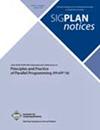Program synthesis using conflict-driven learning
Q1 Computer Science
引用次数: 132
Abstract
We propose a new conflict-driven program synthesis technique that is capable of learning from past mistakes. Given a spurious program that violates the desired specification, our synthesis algorithm identifies the root cause of the conflict and learns new lemmas that can prevent similar mistakes in the future. Specifically, we introduce the notion of equivalence modulo conflict and show how this idea can be used to learn useful lemmas that allow the synthesizer to prune large parts of the search space. We have implemented a general-purpose CDCL-style program synthesizer called Neo and evaluate it in two different application domains, namely data wrangling in R and functional programming over lists. Our experiments demonstrate the substantial benefits of conflict-driven learning and show that Neo outperforms two state-of-the-art synthesis tools, Morpheus and Deepcoder, that target these respective domains.使用冲突驱动学习的程序综合
我们提出了一种新的冲突驱动程序综合技术,它能够从过去的错误中学习。给定一个违反期望规范的虚假程序,我们的综合算法识别冲突的根本原因,并学习新的引理,以防止将来出现类似的错误。具体来说,我们介绍了等价模冲突的概念,并展示了如何使用这个想法来学习有用的引理,这些引理允许合成器修剪大部分搜索空间。我们实现了一个通用的cdcl风格的程序合成器,名为Neo,并在两个不同的应用领域对其进行了评估,即R中的数据争用和列表上的函数式编程。我们的实验证明了冲突驱动学习的巨大优势,并表明Neo优于针对这些各自领域的两种最先进的合成工具Morpheus和Deepcoder。
本文章由计算机程序翻译,如有差异,请以英文原文为准。
求助全文
约1分钟内获得全文
求助全文
来源期刊

ACM Sigplan Notices
工程技术-计算机:软件工程
CiteScore
4.90
自引率
0.00%
发文量
0
审稿时长
2-4 weeks
期刊介绍:
The ACM Special Interest Group on Programming Languages explores programming language concepts and tools, focusing on design, implementation, practice, and theory. Its members are programming language developers, educators, implementers, researchers, theoreticians, and users. SIGPLAN sponsors several major annual conferences, including the Symposium on Principles of Programming Languages (POPL), the Symposium on Principles and Practice of Parallel Programming (PPoPP), the Conference on Programming Language Design and Implementation (PLDI), the International Conference on Functional Programming (ICFP), the International Conference on Object-Oriented Programming, Systems, Languages, and Applications (OOPSLA), as well as more than a dozen other events of either smaller size or in-cooperation with other SIGs. The monthly "ACM SIGPLAN Notices" publishes proceedings of selected sponsored events and an annual report on SIGPLAN activities. Members receive discounts on conference registrations and free access to ACM SIGPLAN publications in the ACM Digital Library. SIGPLAN recognizes significant research and service contributions of individuals with a variety of awards, supports current members through the Professional Activities Committee, and encourages future programming language enthusiasts with frequent Programming Languages Mentoring Workshops (PLMW).
 求助内容:
求助内容: 应助结果提醒方式:
应助结果提醒方式:


